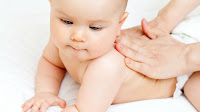All newly became parents worride about when should newborn baby strt applying baby lotion or how to apply it ? In this blog we give you all answer about your questions .
When should Newborn children start applying baby lotion?
What are some common baby care issues?
Eczema (Atopic Dermatitis)
Rosy cheeks can be cute, but they also be a sign of eczema or atopic dermatitis, one of the most common skin conditions in babies. Babies with eczema have trouble keeping moisture locked in, so the skin becomes dry, itchy, and cracked—a perfect setup for outside irritants to cause trouble. Baby faces are one of the first areas that eczema shows up. This usually starts in infancy, with 65 percent of patients developing symptoms in the first year of life and 90 percent developing symptoms before age 5.
Common triggers include, wool, heat, or the chemicals in soaps, fragrances, lotions, and detergents. Be on the lookout for signs of seasonal allergies, asthma, or flares with certain food groups.
Doctors usually treat this with a strict regimen of moisturization and may prescribe steroid creams for serious cases.
Baby Acne
It looks like you can thank maternal hormones that cross the placenta for those little reddish facial pimples and pustules on your newborn's face. You're not alone in dealing with baby acne —it happens to about 20 percent of babies. And heat, crying or harsh detergents can actually make things worse. But don't worry— the acne will eventually disappear. "Neonatal acne generally resolves itself within three months," says Britt Craiglow, M.D., a Yale trained, double board-certified dermatologist based in Connecticut. In the interim, soothe the skin with mild, non-soap and use fragrance-free, non-comedogenic lotions to moisturize baby's skin . For stubborn situations, a health care provider may use a prescription to clear things up.
Milia
These tiny, white pearl-like cysts can occur on your baby's forehead, nose, cheeks, or chin. They are often noticed at birth, and happen in up to 40 percent of newborns. As tempting as it may be, try not to poke, prod, or pop. These are not pimples, and messing with them will lead to unnecessary irritation. Although there is no known cause, and no way to avoid them, most milia are history in a just a couple of weeks, so just hang tight and all will be right.
Irritant Contact Dermatitis
As the name suggests, this rash appears when your baby's skin gets inflamed by an irritant. Red patches and pink bumps, mainly around the mouth, make this easy to identify. Common culprits in the newborn age group include drool and messy meals. Don't confuse this with eczema—irritant contact dermatitis won't itch.
Impetigo
Impetigo is a highly contagious infection that happens when staph or strep bacteria enter the skin through eczema patches, cuts or scrapes, or even when your baby scrapes her face with her little nails. Pus-filled blisters and honey-colored, crusted patches, particularly around the nose and mouth, are hallmark signs of this infection. Your doctor will treat impetigo with a topical or oral antibiotic. After 24 hours of treatment your child will no longer contagious.
Why is it necessary to apply lotion to Newborn Baby's skin?
Tips for applying lotion to Newborn Baby Following are some tips for applying baby lotion to baby:
Things to keep in mind when applying lotion:
Please follow the following safety tips for applying lotion to Newborn Babies, let's learn;
How to choose the best baby lotion for Newborn children?
Follow the following tips to find the best lotion for
- Skin Condition: Are you trying to treat a medical skin condition? Or simply trying to keep your baby’s skin hydrated? Choose the best product for your specific purpose.
- Ointment, Cream, or Lotion: Depending on your baby’s skin condition, choose the formulation that best suits their needs.
- First Ingredient: Look at the ingredient list. The first ingredient is the main component of the product. If it’s water, it will primarily provide hydration. If the first ingredient is oil, it will offer your baby’s skin protection (but feel greasy). Make sure that the product you choose fits your needs.
- Fragrances: If you’re applying lotion along with a baby massage as part of a bedtime routine, you may want a lavender scent to help with nighttime calming. If you want your baby smelling sweet after a bath, something honey-scented may be the right choice. And if your baby have sensitive skin they may be best served by no fragrances at all, as fragrance additives have the potential to irritate the skin.



















0 Comments